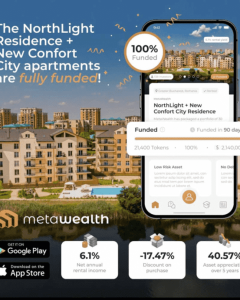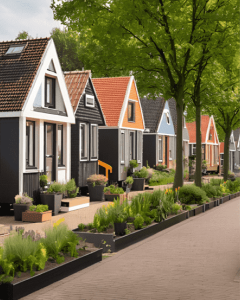Norway Housing Market Sees Decline as Economy Slows - Breaking News
Breaking News: Norway's housing market is experiencing a decline as the economy slows down. Discover the latest data and statistics on the nationwide house price index and the impact of inflation on house prices.
Norway's housing market is showing signs of cooling down, as interest rates rise, inflation remains high, and economic growth slows. According to data from Statistics Norway, the nationwide house price index fell slightly by 0.14% in the second quarter of 2023 compared to the same period last year. This marked the second consecutive quarter of year-on-year decline and the worst performance since the first quarter of 2018. Adjusted for inflation, house prices in Norway dropped by a larger 6.25% during this period. However, on a quarterly basis, house prices still increased by 3.93% (1.58% adjusted for inflation) in the second quarter of 2023.
Breaking down the regions, Akershus excluding Bærum experienced the largest annual house price decline of 1.75% (-7.76% adjusted for inflation) in the second quarter of 2023. This was followed by Vestfold and Telemark, Viken excluding Akershus, Nord-Norge, and Innlandet with declines of -1.46%, -0.54%, and -0.07% respectively. On the other hand, regions such as Møre og Romsdal, Vestland excluding Bergen, Trøndelag excluding Trondheim, and Agder and Rogaland excluding Stavanger continued to see house price increases, but at a much slower pace of 0.84%, 2.13%, and 3.18% respectively.
The decrease in demand is also evident. In 2022, the total number of residential property transactions in Norway declined by 9.3% to 93,292 units compared to an increase of 7.1% in 2021. The weakness in the housing market persisted into 2023, with property transactions nationwide slightly decreasing by 0.2% year-on-year to 18,635 units in the first quarter.
Residential construction activity has also been on the decline. Dwelling starts fell by 0.9% in 2022 compared to the previous year, and completions were down by 1.4% during the same period. The trend continued in the first seven months of 2023, with starts plunging by 29.7% year-on-year to 12,371 units and dwellings under construction decreasing by 12.7% to 43,001 units. However, completions saw a slight increase of 8% to 16,380 units during this period.
While Norway's mainland economy grew by 3.3% in 2022 and continued to expand in the first quarter of 2023, the growth rate is projected to slow down to 1.3% this year and 1.6% in 2024. This forecast is based on government predictions. The country's long house price boom has seen existing detached house prices in Oslo soar by 250% between 2002 and 2022, and by 169% nationwide. The average price per square meter for an existing detached house in Norway was NOK 30,328 (US$2,834) in 2022.
Norwegian authorities have implemented strict mortgage loan restrictions to curb house price increases. Despite the recent rise in interest rates, they remain below international standards. The Ministry of Finance has been closely monitoring lending practices due to the country's high level of debt-to-income ratio.
The housing market situation in Norway differs from what is traditionally seen in a housing bubble. Although house prices have risen significantly over the past decade, rental prices have also witnessed substantial growth, indicating a balanced relationship between the two. However, in Oslo and its neighboring municipality Bærum, house prices are outpacing rent increases.
Rental yields for residential properties in Oslo are relatively low, ranging from 2.28% to 4.0%. Smaller properties generally offer higher yields compared to larger ones. Oslo's residential property prices have been declining this year, positioning the city as the world's 15th most expensive place to buy a home. As for rental prices, Oslo is considered the eighth most expensive capital in Europe.
With reduced construction activity and limited housing supply, Norway faces undersupply issues. The International Monetary Fund (IMF) has recommended relaxing constraints on new property construction to address rapid house price rises. However, factors such as the COVID-19 pandemic and global supply chain disruptions have hampered residential construction efforts.
In conclusion, Norway's housing market is experiencing a cooling trend with declining house prices, decreasing demand, and limited residential construction activity. The country's mainland economy continues to grow, although at a slower pace. Norwegian authorities have implemented strict mortgage loan regulations to restrain house price increases. Despite these measures, challenges related to housing undersupply persist in the market.
Norway Housing Market Sees Decline as Economy Slows - Breaking News
Greece Real Estate Market: Residential Slowdown Ahead
Experts predict a slowdown in Greece's residential real estate market, with house price growth expected to decelerate in the coming months and years.
Experts predict a slowdown in Greece\'s residential real estate market, with house price growth expected to decelerate in the coming months and years.
Read morePortugal Real Estate Market: Luxury Trends for 2024
Explore the 2024 trends in Portugal's luxury real estate market, a prime destination for investors and buyers seeking exceptional opportunities.
Explore the 2024 trends in Portugal\'s luxury real estate market, a prime destination for investors and buyers seeking exceptional opportunities.
Read moreFrench Property Market: Recovery Signs Amidst Challenges
Discover six key insights from notaire data on the French property market's recovery post-Covid, despite ongoing low sales and prices.
Discover six key insights from notaire data on the French property market\'s recovery post-Covid, despite ongoing low sales and prices.
Read moreMetaWealth’s $1.5M Digital Funding for Athens Real Estate
MetaWealth seeks to raise $1.5M in Greece through digital currency to develop a residential building, utilizing blockchain for secure financing.
MetaWealth seeks to raise $1.5M in Greece through digital currency to develop a residential building, utilizing blockchain for secure financing.
Read moreLisbon Apartments: Europe’s Most Affordable Rentals
Explore why Lisbon apartments are the cheapest in Europe, as rents rise 4.3% across the continent, according to the HousingAnywhere Index.
Explore why Lisbon apartments are the cheapest in Europe, as rents rise 4.3% across the continent, according to the HousingAnywhere Index.
Read moreReal Estate Facts: Tiny Homes Trend in the Netherlands
The Netherlands sees a rise in homes under 50 sqm, including "flex homes." Yet, many citizens still prefer larger living spaces, warns Netherlands Environmental Assessment Agency (PBL).
The Netherlands sees a rise in homes under 50 sqm, including "flex homes." Yet, many citizens still prefer larger living spaces, warns Netherlands Environmental Assessment Agency (PBL).
Read moreAustralia real estate market: Sydney Home Prices Dip Amid Affordability Concerns
Explore the October trends in the Australia real estate market as Sydney home prices decline for the first time in nearly two years.
Explore the October trends in the Australia real estate market as Sydney home prices decline for the first time in nearly two years.
Read moreFrance’s Real Estate Market: Home Prices Decline Slows in 2024
New notaire data reveals a slowing decline in house prices across France, with a -0.6% drop in early 2024, signaling potential market stabilization.
New notaire data reveals a slowing decline in house prices across France, with a -0.6% drop in early 2024, signaling potential market stabilization.
Read moreNew Zealand Housing Market Needs Summer Surge for Recovery
ANZ Bank warns that New Zealand's stagnant housing market requires a summer sales boost to clear listings and support price recovery by 2025.
ANZ Bank warns that New Zealand\'s stagnant housing market requires a summer sales boost to clear listings and support price recovery by 2025.
Read more














